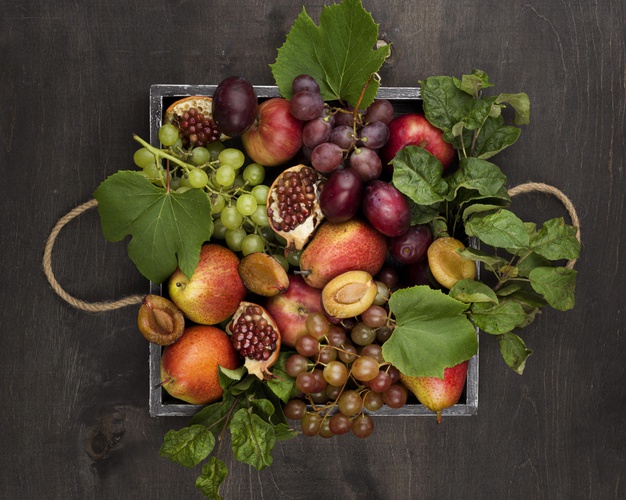The Coronavirus has grown by leaps and bounds, this means as the number of cases increase, new highs are observed every single day, which makes the case of immunity every more strongly felt. Eating seasonal produce is one important factor of building one’s immunity. Not only are they fresh, but they are loaded with minerals and vitamins essential to fight the seasonal viruses and infections of the seasons.
The change in season brings an array of local fruits and vegetables growing in our community, our backyard, and the local farmers market. Consuming them is great for our health, they build our immunity and keep us away from lifestyle diseases.
Do you know that’s seasonal fruits and vegetables are the healthiest if they are eaten in the correct season as they grow??? For instance, if you are eating cauliflower in summers the chances of gasses and gastric infection will be high because cauliflower is a winter vegetable. The same goes for mangoes which is a summer fruit.
Here are a ready reckoner of the vegetables and fruits grown according to seasons-
| Month | Seasonal Fruits and Seasonal Vegetables Grown |
| January | Brinjal, cauliflower, beetroot, peas, broccoli, carrot, radish, palak, tomatoes, cabbage, capsicum, papaya, pomegranate, guava, pineapple, strawberries, grapes. |
| February | Cabbage, capsicum, spring onion, broccoli, methi, carrot, radish, grapes, pineapple, strawberries, oranges, guava, papaya, pomegranate, chickoo, musk melon. |
| March | Spinach, fenugreek, capsicum, carrot, parwal (pointed gourd), tindora (ivy gourd), pumpkin, watermelon, mango, grapes, orange, pineapple, banana, muskmelon, strawberries |
| April | Lady’s finger, cucumber, doodhi, tendli, karela, chawli, beans, parwal, tindora, pumpkin, watermelon, mango, grapes, orange, pineapple, banana, muskmelon, strawberries, jackfruit |
| May | Doodhi, beans, spinach, cucumber, karela, black jamuns, watermelon, muskmelon, litchis, jackfruit, mangoes, papaya. |
| June | Spinach, lady’s finger, cucumber, gawar, corn, capsicum, sweet potato, mangoes, papaya, black jamuns, litchis, jackfruit, watermelon, muskmelon |
| July | Spinach, lady’s finger, cucumber, gawar, corn, capsicum, sweet potato, custard apple, papaya, black jamuns, litchis, jackfruit, watermelon, muskmelon |
| August | Spinach, lady’s finger, cucumber, gawar, corn, capsicum, sweet potato, round gourd, doodhi, snake gourd, karela, custard apple, papaya, black jamuns, litchis, jackfruit, watermelon, muskmelon |
| September | Lady’s finger, cucumber, gawar, corn, capsicum, sweet potato, round gourd, doodhi, snake gourd, karela, guava, papaya, pomegranate, custard apple, passion fruit. |
| October | Brinjal, tomatoes, dill, spring onions, pomegranate, custard apple, passion fruit |
| November | Brinjal, tomatoes, dill, spring onions, french beans, orange, dates, guava, papaya, pomegranate, custard apple. |
| December | Radish, beetroot, yam, fig, guava, custard apple, sweet lime, pineapple, strawberries, orange. |
The Benefits of Eating Seasonal Fruits and Seasonal Vegetables
Though eating healthy and organic is the new trend, we must not forget that since old times, our parents and grandparents have eaten seasonal fruits and vegetables and kept themselves fit. Though with the changes in agriculture and technology, seasonal fruits and vegetables are available 365 days a year, we must not forget the harmful pesticides used to keep them last in non-seasons.
Thus, eating fresh produce is essential here, are the benefits of the seasonal fresh farm produce-
- Flavour – Fresh produce not only tastes amazing, but it is also filled with anti-oxidants and travels locally. In the testing COVID-19 times, to reduce the fear of infectivity consider switching to local fresh produce.
- Nutrition – With the seasonal fruits and vegetables you will be gaining the gift of nature, which implies vital minerals and natural flavors. Seasonal produce is harvested in the peak of the season which implies it gets the proper temperature and air and soil to grow, which adds up to its nutritional value.
- Cost – Seasonal fruits and vegetables are cost-effective because they are grown locally and transported locally. This saves the middlemen costs and storage and refrigeration costs. Thus, seasonal fruits and seasonal vegetables are pocket-friendly too.
- Environment – We should not forget that we live as a part of a larger macro system. This implies that we must and should take care of the environment we live in, for the sake of future generations. Seasonal local fruits and vegetables add to less carbon footprint, and do not harm the environment, and build our immunity against the harmful monsoon infections.
- Community – Going by saving the environment terms, seasonal fruits and vegetables support our local community as well. In the Coronavirus era, where millions of people are staying at home, buying local will help them to earn a livelihood as well.
The Seasonal Infections and Virtual Consultation
The monsoon season brings additional challenges besides Coronavirus. Healthcare facilities have been in difficult times to cope up with these existing monsoon diseases the fear of contamination from a hospital/ medical clinic visit adds to the infectivity woes. To mitigate the harm, consider adopting Virtual Healthcare practices for seasonal infections for you and your family.
Booking a digital doctor on the Gigadocs app and consulting expert medical practitioners from your home ensures that you follow social distancing for supervised advice. Telemedicine Consultation saves from the risk of infectivity and is good for expert consultation for non-chronic diseases and routine check-ups.
Gigadocs is an intelligent practice management app that lets you book telemedicine doctors for yourself, your children, and senior citizens and consult them from the privacy of your home. On the Gigadocs app consult an orthopedic, infectious disease specialist, pediatrician, or a dentist from your home and prevent the Coronavirus infectivity transmission which you may catch visiting a physical doctor.
What do you need to book a digital doctor?
- A tab or a smartphone with camera facilities
- A high-speed internet connection
Book a Virtual Consultation- Download Gigadocs app from-
- IOS App – apple.co/2W2iG4V
- Android App – bit.ly/33AQoRC
To know more and schedule a Virtual Consultation demo, e-mail, at info@gigadocs.com




